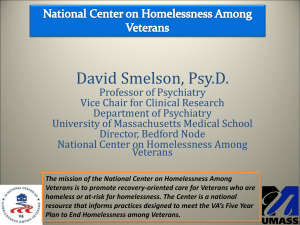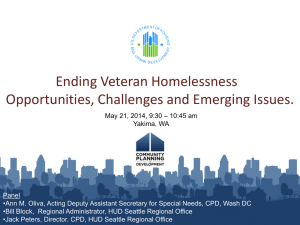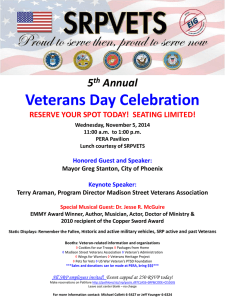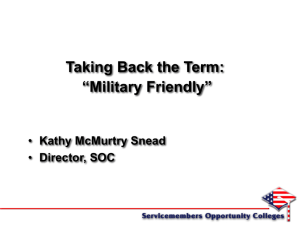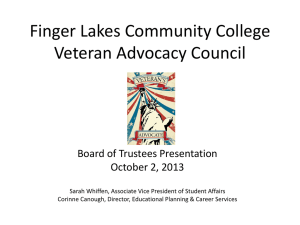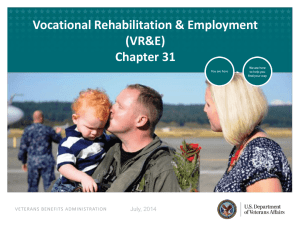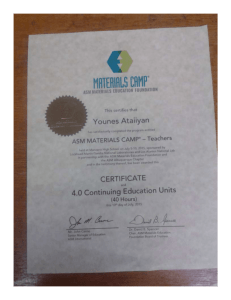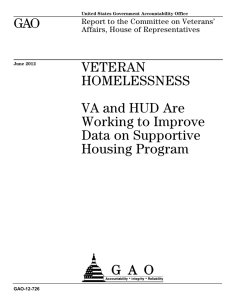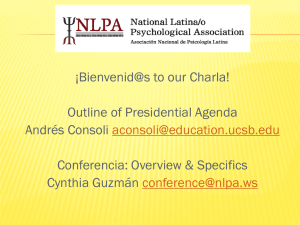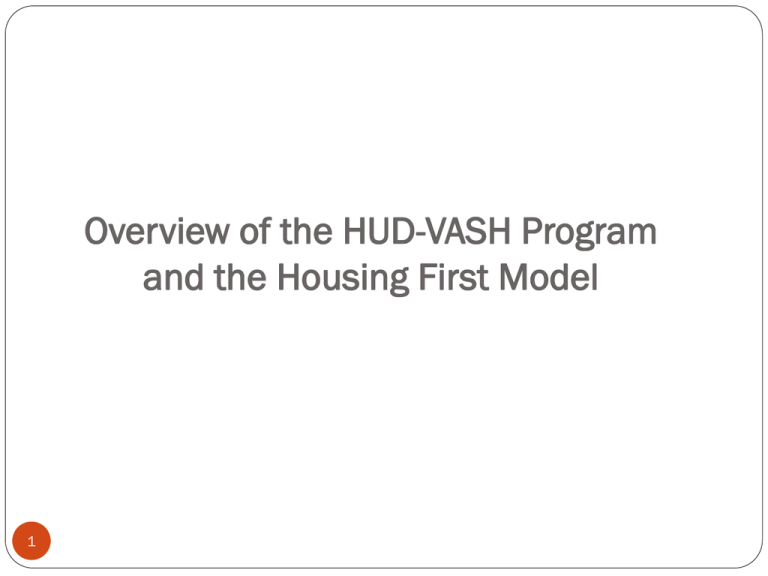
Overview of the HUD-VASH Program
and the Housing First Model
1
The HUD-VASH Program is a collaborative partnership
between the Department of Housing and Urban
Development and the Department of Veterans Affairs with
the goal of providing permanent supported housing to
homeless Veterans.
Housing Choice vouchers provided by HUD permits
affordable supported permanent housing for homeless
Veterans and their families. Homeless Veterans must meet
HUD-VASH criteria and be willing to actively participate in
their program of recovery from homelessness with a case
manager, who delivers supportive, housing focused services.
Population Served
The chronically homeless Veteran and their families.
Veterans with complex behavioral health or medical
conditions.
Veterans with little experience or continued success with
managing or maintaining independent housing.
HUD-VASH cannot work with Veterans required to
register as lifetime sex offenders.
3
HEARTH ACT
Veterans who are living in a place not meant for human habitation, in
emergency shelters, in transitional housing, or are exiting an institution where
they temporarily resided.
Veterans who are losing their primary nighttime residence, which may include a
motel or hotel or a doubled up situation, within 14 days and lack resources or
support networks to remain in housing.
Veterans with children who are unstably housed and likely to continue in that
state. This is a new category of homelessness, and it applies to families with
children who have not had a lease or ownership interest in a housing unit in the
last 91 or more days, have had three or more moves in the last 90 days, and who
are likely to continue to be unstably housed because of disability or multiple
barriers to employment.
Veterans who are fleeing or attempting to flee domestic violence, have no other
residence, and lack the resources or support networks to obtain other
permanent housing.
HUD-VASH Eligibility
Veterans and their
families must meet
HUD’s low
income limits;
over-income
households cannot
be enrolled
Homeless Veterans
and their families
• Identified case
management needs
• Target is 65%
chronically
homeless
Persons on lifetime
sexual offender
registration under
a state sex
offender registry
program are not
eligible
5
Family members
added after leasing
must meet
standard PHA
eligibility
Total Voucher Allocation by Year
2008 – 35 vouchers in Albuquerque
2009 - 35 vouchers in Albuquerque
2010 - 25 vouchers in Gallup
2010 – 35 vouchers in Santa Fe
2010 -50 vouchers in Albuquerque
2011 – 25 vouchers in Albuquerque
2012 – 25 vouchers in Albuquerque
2013 – 110 vouchers (Albuquerque, Farmington, Durango,
Valencia County)
2013 VASH Vouchers
Albuquerque HA– NM001
7
35 vouchers – 20 - Albuquerque 15 – NW Metro CBOC (Rio Rancho)
Bernalillo County HA – NM057 30 vouchers - Albuquerque, Unincorporated Bernalillo County and Rio Rancho
San Juan County HA – NM066 15 vouchers - Farmington area
El Camino Rael HA – NM077 15 vouchers - Belen and Los Lunas
Durango HA
15 vouchers - to be determined
Why Housing First?
8
It ends homelessness.
Housing First eliminates the need for costly shelter care
and transitional and short-term treatment services aimed
at preparing veterans to be “housing ready or housing
worthy.”
Studies demonstrate that Housing First reduces ER visits,
unscheduled mental health and medical hospitalization.
Decreases the frequency and duration of homelessness.
Why Housing First ? – continued
• Housing First is an approach that centers on providing
homeless people with housing quickly and then
providing services as needed.
• What differentiates a Housing First approach from other
strategies is that there is an immediate and primary focus
on helping individuals and families quickly access and
sustain permanent housing.
• This approach is consistent with what most people
experiencing homelessness want and seek help to
achieve.
9
HUD-VASH Case Management
Case management is a mandatory requirement for a
10
minimum of one year; after one year Social Worker and
Veteran reassess need for continued case management.
Every Veteran enrolled in the HUD-VASH program is
assigned to an Independently Licensed Clinical Social Worker
who provides case management.
Housing needs and treatment goals are identified.
Monthly home visits are mandatory.
Rent and utilities are monitored by the case manager.
Other housing related issues/concerns are monitored.
The Voucher/Housing Process
Veteran and case manager work with the PHA (public housing
11
authority) to obtain a Housing Choice Voucher.
Veteran and case manager identify voucher friendly properties.
Veteran completes apartment application and provides for any
application/damage deposit fees.
Once application is approved, case manager assists Veteran with
completion of documentation for PHA (Request for Tenancy) and
insures documentation is returned to PHA so that an inspection by
the PHA can be scheduled.
Once apartment passes PHA inspection, the lease is signed and
Veteran can move into housing.
Terminations
12
Successful Terminations
Veterans may be successfully terminated from the HUD-
VASH Program and can keep their Housing Choice Voucher
after participating in the program for a minimum of one year,
and upon meeting the goals of their treatment plan. HUDVASH case manager must agree with case management
termination.
Termination also occurs upon Veteran becoming “over
income” to participate in the Housing Choice Program.
Veterans may “port” their voucher to another HUD-VASH
program only if there is a case management slot open in the
city that Veteran wishes to port to.
Albuquerque Performance
As of September 1, 2013 there are 210
formerly homeless Veterans and their
families that are now housed via the
Albuquerque HUD-VASH Program.
Questions/Discussion
Barbara H. Nolan, MSW, LISW
HUD-VASH Program Coordinator
1501 San Pedro SE
Albuquerque, NM 87108
505-265-1711 x-2902 – office
505-414-0208 – cell
505-256-2819 – fax
barbara.nolan@va.gov
15

